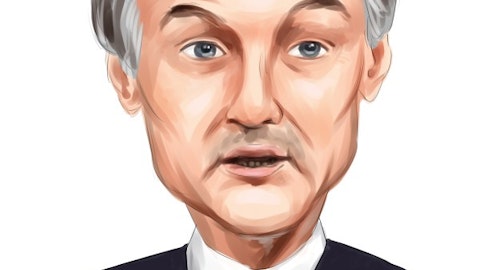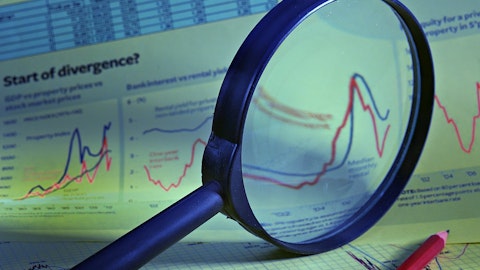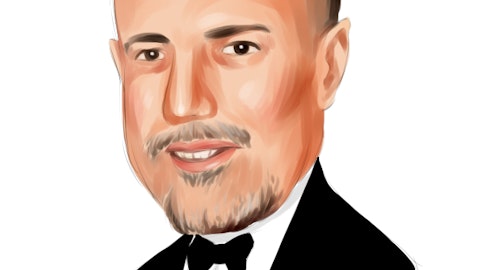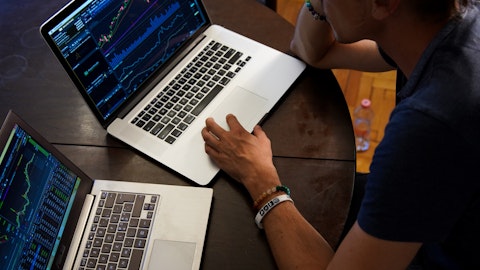So, we believe that with both Likee and Hago approaching self-sufficiency, they would be in a better position to revisit user base expansion after the adjustment. Thank you.
Operator: Your next question comes from Yiwen Zhang from China Renaissance.
Yiwen Zhang: Thanks for taking my question. My question is regarding the World Cup. This year it was hosted in Middle East, which as well is our important market. Can management comment the impact on our operation, including the user engagement and also, user spending?
David Xueling Li: Thank you. This is David. I will answer your question. I believe that the World Cup both have positive and negative impacts on our business. During the World Cup, we expect users to spend more time watching the games through traditional media such as TV or engaged in an increased number of off-line entertainment activities, which will divert some of our users’ time spent from mobile products such as our social entertainment products such as live streaming and short videos. Therefore, there might be some negative impact on our DAUs’ user time spent, especially in the Middle East, where the event is held and possibly in countries with a participating team. However, this also could be an opportunity for us to bring in a special content activity for our users.
For example, to help our users better enjoy the World Cup, we have launched a series of special activities related to the theme, such as inviting football KOLs to host World Cup commentary sessions on Bigo Live and also Likee and also launching World Cup team-specific and event-specific live streaming rooms, et cetera. So, considering that in Q4 Bigo Live will host its Annual Gala, together with an increased number of operational activities to promote user and creator activity, we expect the impact from World Cup on user activity and monetization should be neutralized. Thank you.
Operator: Your next question comes from Brian Gong at Citi.
Brian Gong: I will translate myself. How does management view the geopolitical risks to our business and what is the regulatory trend in different overseas markets? And also can management update any plan on usage of our strong cash on hand?
David Xueling Li : Thank you, Brian, for your question. This is David. I will answer your questions. For your first question on geopolitical risk, I’d say that global geopolitical risk does not just emerge today, but there are always long-lasting risk for a global company. And we would like to say that it’s a normal operational risk factor for a global company with global exposure. But we would say that it’s also created a positive impact for global players as compared to a single market player because of the fact that we have operations in various regions. And usually, it means that for some reason, there would be growth opportunities, but for some reasons and some time, such geopolitical risk might emerge. And then when you look at the global level, it’s actually neutralized and better.
When it comes to risk diversification, we are in a better position as compared to a single market player in the industry. With regards to our cash usage, given the current macro uncertainties, we have been reviewing and sharpening our focus on a clear set of business priorities and become more selective in our expenditure. We have prioritized investments in our core businesses and also businesses that we believe that will be crucial for our mid- to long-term growth. So, it’s a matter of balancing, balancing between making sure that we ensure sufficient capital for our own organic growth of our core businesses and also making sure that we have enough capital to return to our holders. You can see that from our operating cash flow, we have been very healthily improving our operating cash flow and have a very strong cash position.
As a company that is still seeking growth, we have been very generous in enhancing shareholder returns. If you look at the first 3 quarters, we have already distributed in total $216.7 million via dividends and share repurchases, which is equivalent to 145% of our non-GAAP net profit in the first 3 quarters. And as of today, we still have the remaining share repurchase program of up to $800 million and dividend program of approximately $150 million, which is very sizable, especially when you compare it to our market cap. So to sum up, we will continue to remain financially flexible and strike a balance between keeping sufficient cash to invest in our business and enhancing return for our shareholders. So, I believe that we have already taken all of the questions and thank you very much for joining our call.
We look forward to speaking with everyone next quarter. Thank you.
Operator: Thank you. The conference is now concluded. Thank you for attending today’s presentation. You may now disconnect.
Follow Joyy Inc. (NASDAQ:JOYY)
Follow Joyy Inc. (NASDAQ:JOYY)
Receive real-time insider trading and news alerts




